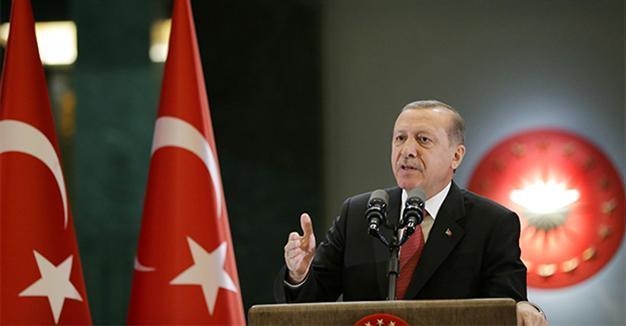New judicial powers for president stir row
Oya Armutçu - ANKARA

AA photo
President Recep Tayyip Erdoğan could soon be free to choose 24 members of the 96-seat Council of State all on his own if a judicial reform package is adopted, making him the first-ever president to assign one fourth of a high court.
The 38 article-draft that would restructure the Supreme Court of Appeals and the Council of State was recently introduced by the ruling Justice and Development Party (AKP) to the parliament speaker’s office with plans to have it passed before parliament goes to recess at the end of June.
The draft has resulted in irritation in the high judiciary, with some members of the Supreme Court of Appeals and the Council of State considering resignation in protest at what they say is an unconstitutional proposal.
“The esteemed presidents of the Supreme Court of Appeals and the Council of State have received their recompenses for picking tea leaves along with the president like a day laborer,” a member of the Supreme Court of Appeals, who requested anonymity due to sensitivity of the matter, told Hürriyet in reference to Supreme Court of Appeals President İsmail Rüştü Cirit and Council of State President Zerrin Güngör’s recent trip to a tea plantation with Erdoğan, which drew condemnation from Turkey’s opposition.
According to the draft, the number of chambers in the Supreme Court of Appeals will be reduced from 46 to 24, while the number of members of the same court will be reduced from 516 to 200. Likewise, the number of Council of State chambers will be reduced from 17 to 10 as the number of members in the court is reduced from 195 to 90.
The new members of the Council of State will be selected from among those whose memberships have ended, according to their relevancy, by the Supreme Council of Judges and Prosecutors (HSYK) or the president within five days after the law goes into effect. According to the constitution, one fourth of the members of the Council of State are selected by the president.
The number of council members will be fixed at 116 on the date the law goes into force. The president will make his choices from among the 96 members that are currently serving – except for the current president, chief prosecutor, deputy president and chiefs of the 17 chambers.
Erdoğan will directly select one fourth of those members – or 24 members of the restructured council. These members will serve at the council for 12 years.
According to the draft, members who were previously elected to the Council of State by the presidency can be re-elected by the president himself. If these members are not re-elected by the president, then they will have the right to choose a new appointment, including in the administrative jurisdiction if they so desire, or return to the bureaucracy based on certain conditions.
Judicial avenues closed
Members of the council will be granted the right to appeal to the Board of Presidents in order to object to decisions made by the Board of the Presidency within seven days of the decisions being made by the board.
The Board of the Presidency is in charge of determining the division of work among chambers, the job status of chambers, the location of duty of members, as well as reshuffling member judges and chamber chiefs when necessary.
However, the rulings from the Board of the Presidency which will evaluate the objections will be final and no other judicial means will be open to appeal.
Additional 12 years’ tenure for presidents
Accordingly, Cirit and Güngör will continue in the same posts for another 12 years.
Along with Cirit and Güngör, the deputy presidents of the two high courts, the chief public prosecutors and the deputy chief prosecutor of the Supreme Court of Appeals and the chiefs of chambers at both the two high courts will hold their positions for another 12 years.
